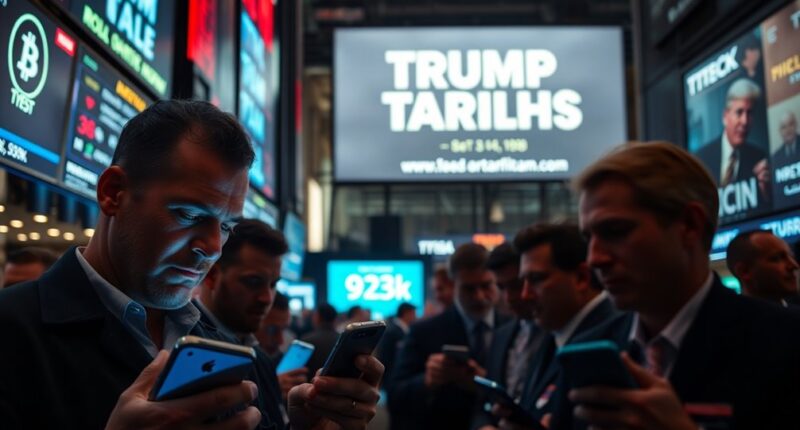Trump's recent tariffs have sent Bitcoin crashing to $93,000, shaking confidence in the crypto market. You'll notice how these tariffs, specifically 25% on Canadian and Mexican goods, have triggered wider economic anxiety. This uncertainty has led to significant sell-offs, pulling Bitcoin down alongside other cryptocurrencies. The interconnectedness of economic policies and digital currencies is evident here. Stay tuned, and you'll uncover more about how these developments impact the overall cryptocurrency landscape.
Key Takeaways
- Trump's tariffs on goods from Canada, Mexico, and China triggered fears of inflation and increased investor anxiety in the market.
- Bitcoin's price fell to approximately $93,000, marking a significant decline amidst broader sell-offs in global financial markets.
- Cryptocurrency stocks like Coinbase and MicroStrategy also experienced declines of 5% or more due to increased market volatility.
- A temporary rebound in Bitcoin occurred after a pause on Mexican tariffs, indicating sensitivity to policy changes.
- The tariffs highlight the connection between economic policies and cryptocurrency market volatility, affecting investor sentiment and decision-making.

As Trump announced significant tariffs on goods from Canada, Mexico, and China, the cryptocurrency market faced a sharp decline—most notably, Bitcoin plummeted to about $93,000. This drop marked Bitcoin's fourth straight day of losses, a stark contrast to its previous peak of over $109,000 just ahead of Trump's inauguration.
The broader decline in cryptocurrency values was evident, with Ethereum and other altcoins seeing drops exceeding 10%. This decline was further exacerbated by the negative market reaction to potential inflation from tariffs, which increased investor anxiety.
The tariffs, set at 25% for Canadian and Mexican goods and 10% for Chinese products, triggered fears of inflation and potentially stalled interest rate cuts from the Federal Reserve. These economic shifts can heavily influence riskier assets like Bitcoin, which thrive in stable financial environments. The anticipation of a trade war with major partners only added to the uncertainty, leading to a sell-off across global financial markets.
You might've noticed that cryptocurrency-related stocks like Coinbase and MicroStrategy also took a hit, each declining by 5% or more. It's clear that the rally the crypto market enjoyed since Trump's election win faced a sudden halt due to the tariff news.
Even Trump's own meme coin, alongside Melania Trump's meme coin, experienced significant drops, reflecting the volatility permeating the crypto space.
In the midst of this chaos, there was a slight rebound for Bitcoin when Trump announced a pause on Mexican tariffs, showing how interconnected market reactions can be. His administration has been viewed as crypto-friendly, aiming to position the U.S. as a hub for cryptocurrency. However, these tariffs complicate that vision by injecting economic instability into the equation.
Ultimately, the tariffs highlight how intertwined economic policies and cryptocurrency markets are. As you navigate this landscape, staying informed about these developments could be crucial for your investment decisions in the volatile world of crypto.
Conclusion
As the shadows of Trump's tariffs loom large, Bitcoin's value crumbles like a sandcastle swept away by the tide. You can feel the tremors in the crypto market as investors scramble for stability amidst the chaos. This whirlwind of economic policy has shaken the foundations of digital currency, leaving many to wonder if Bitcoin can rise again like a phoenix from the ashes. Keep your eyes peeled; the journey ahead could be just as tumultuous.









